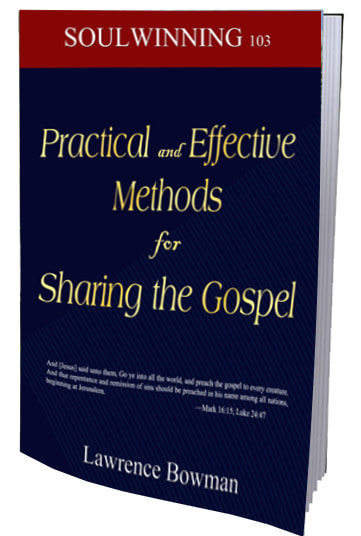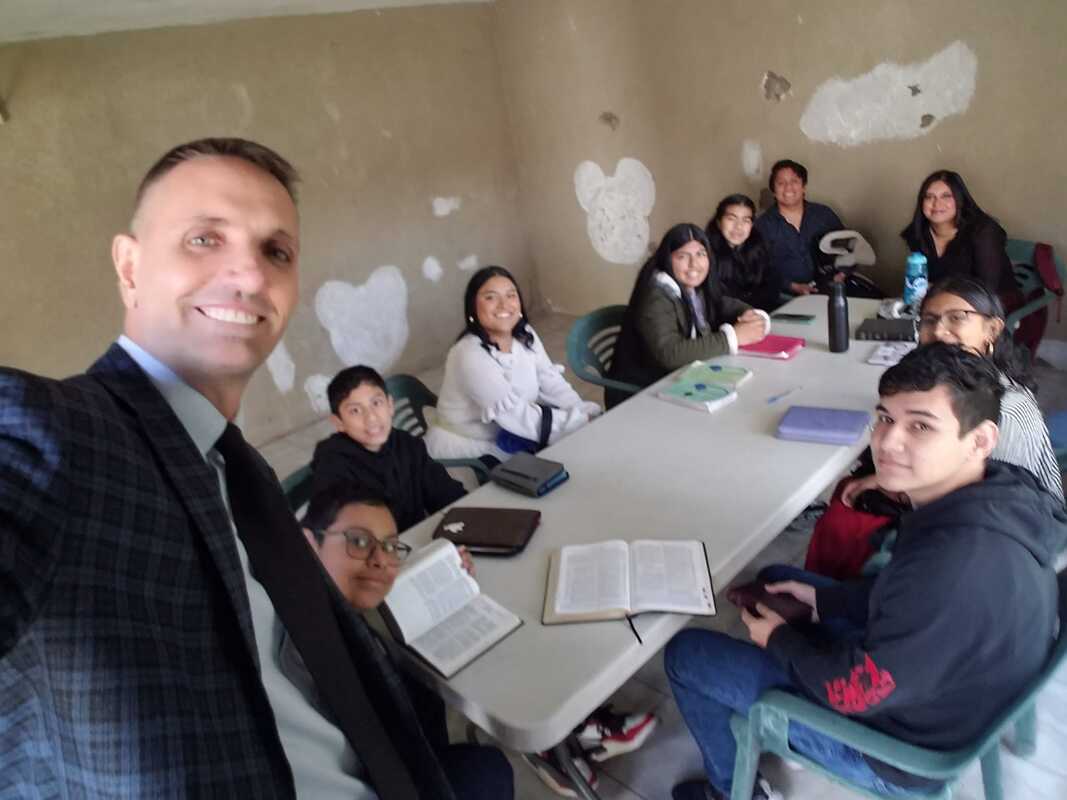
One individual who was a man of prayer in the Holy Bible was the apostle Paul. Quite often in his writings, he would mention how he labored in great heaviness before God in prayer for people (Romans 9:2). Ephesians 1:17-19 is one of those examples. Here, he wrote his prayer out for the brethren to read. I can imagine that, as the pastor of the church in Ephesus read aloud Paul’s letter, the words of Paul’s prayer must have been a great encouragement to them. Today it still continues to enlighten and encourage us. The passage says, “[May] the God of our Lord Jesus Christ, the Father of glory, [give] unto you the spirit of wisdom and revelation in the knowledge of him: The eyes of your understanding being enlightened; that ye may know what is the hope of his calling, and what the riches of the glory of his inheritance in the saints, And what is the exceeding greatness of his power to us-ward who believe, according to the working of his mighty power.”
What a beautiful prayer! God wants to give you and me wisdom. God wants to reveal Himself in a greater depth of understanding. God wants our perception in life to have more godly insight concerning all matters. God wants us to have a lively hope, and partake in His wonderful calling. God wants us to share in the greatness of His power by being effectual vessels of honor for the Lord Jesus Christ. These are just some of the many significant blessings we can obtain through prayer, and some of the matters about which we can pray for people, and for ourselves, that we may obtain them by God’s grace and sovereignty.
The opportunity to be in communion with God is a sure blessing, and it only happens with prayer. Probably one of the greatest blessings prayer offers is the channel to give us full access before God’s throne. There we find the presence of God, for surely, He sits on His throne. In God’s presence, we can pray and receive divine wisdom, instruction, and direction. God desires to genuinely give wisdom to His children, but we must seek and ask for it. James 1:5-6, says, “If any of you lack wisdom, let him ask of God, that giveth to all men liberally, and upbraideth not; and it shall be given him. But let him ask in faith, nothing wavering.” Therefore, spend time with God in prayer and the Holy Bile and you will find knowledge and wisdom and get good understanding.
Problems, setbacks, and troubles are bountiful in supply. These can discourage or dishearten a servant if he is shortsighted; but a servant who is filled with wisdom and understanding trusts in the LORD and leans not on his own reasoning. Likewise, prayerfulness gives a Christian a deeper understanding of the riches of the glory of God’s inheritance in the saints. Prayer is the channel God uses to give Christians discernment with spiritual enlightenment. God gives discernment to a Christian so that he may arise from his prayer chamber and be of genuine service to mankind. If we are going to be ministers (servants) to men, we must be equipped with His understanding so that we can recognize how to best serve individuals according to their needs. Discernment helps a Christian to better understand the principal causes of people’s afflictions.
Discernment, wisdom, and insight are gifts from the Lord. God supplies gifts so that we may appropriately use them to lift up the brethren in times of need. God never gives a gift, such as discernment, to be used as a tool to hurt someone or to exalt ourselves. God gives gifts to believers so that we may humble ourselves and be good and wise servants unto others.
Not only does spiritual enlightenment help us to serve people effectively, it also provides us with clearer insight into problems and dilemmas. As God supplies a Christian with more discernment, wisdom, or understanding, the believer will soon become aware that his sorrows begin to grow as well. Ecclesiastics 1:18 explains, saying, “For in much wisdom is much grief: and he that increaseth knowledge increaseth sorrow.” Thankfully, God will not load us with a burden we cannot bear. The Lord balances sorrow by supplying a believer with joy in the Lord as well. Although sorrow might persist because you see man’s problems and understand their underlying causes, meanwhile you can experience the joy of the Lord by resting in assurance that God’s sovereignty in His timing shall work it all out for the good.
Spiritual enlightenment certainly is a blessing because it also is given to help believers to better appreciate God’s grace of longsuffering. Spiritual enlightenment helps you see God’s gracious hand working among people in the depths of their problems. As we empathize with others, we are drawn closer to the Savior because our own need for God’s grace is made ever more real to us. God patiently works to help us see and understand more of His greatness and holiness.
This is why we need prayer. Prayerfulness serves to expand our understanding of God’s holiness. When you see His holiness you will be arrested with conviction by God’s Spirit of your own sins and weaknesses. Then your mind will be moved to consider your own frailties, rather than the shortcomings of others. As you better see the glory of God, you will certainly be in awe that God would even call you and permit you to partake in His Kingdom service.
God’s holiness causes us to consider all the goodness of God’s grace within our own lives. His holiness brings a humbling to our minds. Our disposition is transformed into a likeness and meekness of Christ. We find that we can no longer be critical of others, but instead we must aspire to esteem others. We come to understand that we must yield ourselves more to Christ; then, if the Lord chooses to call us into more service, we will be better prepared because our hearts and minds are blessed to have been smitten by the Lord.
Hebrews 12:2 instructs that we are to look unto Jesus. However, all too often, we Christians find ourselves mistakenly focused on the works of God rather than on the Lord Himself. For this reason Jesus on one occasion had to reprove His disciples. He said, "Behold, I give unto you power to tread on serpents and scorpions, and over all the power of the enemy: and nothing shall by any means hurt you. Notwithstanding in this rejoice not, that the spirits are subject unto you; but rather rejoice, because your names are written in heaven" (Luke 10:19-20). In verse 19 Jesus identified some of the great works that are possible through His powerful name. But please pay careful attention to verse 20. He immediately directs the disciples attention that our concern should be focused on the intimate relationship we have with God. We are not to seek delight in our labors, but we are to delight in the LORD (Psalm 37:4). God is more interested in communion and fellowship with us than any good labors for Him.
Many times God must correct our improper perspective or viewpoints in matters. Correction always precedes direction. Once our attention is properly on God and our perception is as Christ’s then God can direct us into a specific work. Therefore, we ought to welcome God’s probings and convictions, so that we can be aware of any sin lurking within our hearts. We ought to give God the liberty to deal with any issue, whether good or bad, holy or sinful. If a matter in our life is a hindrance to our fellowship with God, then we should not murmur or resist; we should thank God for His probing, immediately confess sin, remove it out of our lives and abandon it.
God is holy and righteous and He deems His children to be too (1 Peter 1:16). Although our standing is holy and righteous in Christ, sometimes our present state becomes tainted with sin. Prayer is one of those mechanisms that God uses to often clean us up. Prayer brings about convictions, not so that we should run away from God, but that we should draw nearer to Him. If we come to God in prayer with the hope of being made more like Christ, then we will certainly be made more aware of any sins unconfessed to God. For in God no sin is hidden; He wants it recognized, confessed, and forsaken.
Some sins, such as selfishness, gossip, overeating, ill attitudes, doubt, or unforgiveness may be unseen by man, but God sees them. This is why we need to come into the light of Christ and dwell there. The individual who comes to the light, surely, his deeds will be made manifest (John 3:21). As the scriptures says, “But all things that are reproved are made manifest by the light” (Ephesians 5:13). The light of Christ shows and reproves all sins, and they must be renounced. If we confess and forsake our sins, then we can enjoy the wonderful presence of God and recognize His merciful blessings poured upon our lives.
Jesus taught an important principle in Mark 11:25-26. He said, “And when ye stand praying, forgive, if ye have ought against any: that your Father also which is in heaven may forgive you your trespasses. But if ye do not forgive, neither will your Father which is in heaven forgive your trespasses.”
We have all been mistreated by someone. But we must forgive. So when was the last time someone wronged you and therefore you needed to forgive him or her? Did you pray for that individual? Jesus did. He prayed for His wrongdoers, even while hanging on the cross after a brutal vicious beating by them. Jesus prayed, “Father, forgive them; for they know not what they do” (Luke 23:34).
At another time, Christ spoke concerning prayer, saying, “[I]f thou bring thy gift to the altar, and there rememberest that thy brother hath ought against thee; Leave there thy gift before the altar, and go thy way; first be reconciled to thy brother, and then come and offer thy gift” (Matthew 5:23-24). An important principle we need to understand is that before it is possible to engage in true fellowship with a holy God we first must be clean in a practical sense. If we have offended anyone, we need to seek to relieve it. This is the reason we should be in a good habit of asking the Holy Spirit to examine and reveal any sins, faults, or offenses that grieve Him. We can be assured that He will make them known to us. Then our conscience can be at rest by confession to God so that we may seek correction and instruction in righteousness.
If we do not deny God but allow His holiness to bring to our attention sins that hinder our communion with Him, God will certainly bring them to our awareness. Therefore, before we even try to pray for someone, God might cause us to leave the prayer and go seek forgiveness and reconciliation.
This is why many times prayer brings mourning and a holy remorse upon us (Daniel 10:2, 12), because before we try to enjoy communion with God, whom we cannot see with our eyes, God demands that we offer reconciliation to individuals whom we can see. When we confess our faults to one another and to God (James 5:16), then we can draw near to God and engage in a wonderful fellowship with Him.






































